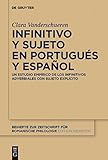Infinitivo y sujeto en portugués y español : Un estudio empírico de los infinitivos adverbiales con sujeto explícito / Clara Vanderschueren.
Material type: TextSeries: Beihefte zur Zeitschrift für romanische Philologie ; 377Publisher: Berlin ; Boston : De Gruyter, [2013]Copyright date: ©2013Description: 1 online resource (353 p.)Content type:
TextSeries: Beihefte zur Zeitschrift für romanische Philologie ; 377Publisher: Berlin ; Boston : De Gruyter, [2013]Copyright date: ©2013Description: 1 online resource (353 p.)Content type: - 9783110301953
- 9783110307733
- 469.5
- online - DeGruyter
- Issued also in print.
| Item type | Current library | Call number | URL | Status | Notes | Barcode | |
|---|---|---|---|---|---|---|---|
 eBook
eBook
|
Biblioteca "Angelicum" Pont. Univ. S.Tommaso d'Aquino Nuvola online | online - DeGruyter (Browse shelf(Opens below)) | Online access | Not for loan (Accesso limitato) | Accesso per gli utenti autorizzati / Access for authorized users | (dgr)9783110307733 |
Frontmatter -- Agradecimientos -- Lista de las abreviaturas -- Índice -- Introducción -- Primera parte: Bases teóricas -- Capítulo 1: El Infinitivo -- Capítulo 2: El Sujeto -- Capítulo 3: Las Subordinadas adverbiales -- Capítulo 4: Planteamiento: el infinitivo adverbial con sujeto explícito en español y portugués -- Segunda parte: Hacia el estudio empírico de los infinitivos con sujeto explícito -- Capítulo 5: El Infinitivo flexionado portugués: nuevas perspectivas para un problema antiguo -- Capítulo 6: El Infinitivo con sujeto léxico: un estudio comparativo -- Conclusiones generales -- Apéndices -- Bibliografía -- Índice de términos
restricted access online access with authorization star
http://purl.org/coar/access_right/c_16ec
El presente volumen se dedica a una de las construcciones más emblemáticas del ámbito iberorromance: los infinitivos adverbiales con sujetos explícitos, p.ej. al entrar Juan (esp), para eles verem o resultado (ptg). Aspira a llenar una laguna empírica y a dar un análisis cognitivo-funcional y comparativo de estas construcciones.La primera parte ofrece una visión de conjunto de las nociones infinitivo, sujeto y cláusula adverbial. La segunda parte consiste en dos estudios concretos. En el primer capítulo, se muestra que el uso del infinitivo flexionado portugués está sometido a factores como la accesibilidad mental del sujeto del infinitivo, la autonomía sintáctico-semántica de la cláusula, la naturaleza verbal del infinitivo y el estatus clausal de la construcción. En el segundo estudio, revelamos que los infinitivos españoles y portugueses con sujetos léxicos explícitos exhiben propiedades distintas: las construcciones portuguesas tienden a ser más complejas y más clausales (con sujetos más prototípicos e infinitivos más cerca del verbo prototípico), mientras que las construcciones españoles tienen una estructura más simple y tienen una naturaleza más nominal. En términos más generales, esta disertación desvela la naturaleza flexible del infinitivo en distintos idiomas, perceptible incluso en dos lenguas hermanas como el español y el portugués.
This volume sheds light upon one of the most emblematic constructions in Ibero-Romance: adverbial infinitives with specified subjects (e.g. al entrar Juan (Sp), para eles verem o resultado (Ptg)). The study attempts to fill an empirical gap and offers a cognitive-functional and comparative account on these constructions.The first part provides an overview of the notions of infinitive, subject and adverbial clauses. The second part consists of two empirical case studies. First, the use of the Portuguese inflected infinitive is shown to be sensitive to factors as the mental accessibility of the infinitival subject, the syntactic-semantic autonomy of the clause, the verbal nature of the infinitive and clausal status of the construction. Second, Spanish and Portuguese infinitives with overt subjects are shown to have different properties: in Portuguese they are more complex and clause-like (having more prototypical subjects and infinitives closer to the verbal prototype), while Spanish infinitives with proper subjects have a simpler structure and are more nominal in nature. More generally, this dissertation illustrates the flexible behaviour of the infinitive in different languages, even in two closely related languages.
Issued also in print.
Mode of access: Internet via World Wide Web.
In Spanish, Castilian.
Description based on online resource; title from PDF title page (publisher's Web site, viewed 25. Jun 2024)


